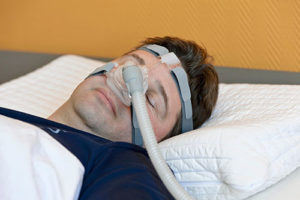 It’s critical for large truck drivers to stay alert on the road, as large trucks are more challenging to maneuver, take longer to stop, and could cause life-threatening injuries in an accident. To remain in top driving form, truckers must get adequate restful sleep. But what happens when a truck driver has a sleep disorder such as sleep apnea?
It’s critical for large truck drivers to stay alert on the road, as large trucks are more challenging to maneuver, take longer to stop, and could cause life-threatening injuries in an accident. To remain in top driving form, truckers must get adequate restful sleep. But what happens when a truck driver has a sleep disorder such as sleep apnea?
Though there’s no law disqualifying truck drivers who have sleep apnea, the Federal Motor Carrier Safety Administration (FMCSA) examines whether a driver is medically qualified to operate a large vehicle. Sleep apnea may affect a truck driver’s qualification.
What is Sleep Apnea, and What are its Effects on Truck Drivers?
Sleep apnea is a disorder where a person involuntarily stops and starts breathing multiple times during their sleep. It is a common condition especially among men who are over 40 years old, those who are overweight, smokers, drinkers, or have a thicker-than-average neck size. Family history and an inherited narrow air passage also increase the likelihood of having sleep apnea.
Though sleep apnea is common and often undiagnosed, it can have significant effects on one’s waking life. The FMCSA notes that it affects the alertness and performance of drivers. In particular, sleep apnea can:
- Make it difficult to stay awake at the wheel
- Slow a driver’s reaction time
- Make it challenging to focus the eyes
- Make a driver inattentive.
These are ingredients for a potential disaster with a large truck. A truck driver doesn’t have to fall asleep at the wheel to cause an accident – in many cases, distracted driving and slow reaction times are enough to lead to a collision. In fact, one study concluded that untreated sleep apnea significantly contributes to motor vehicle accidents.
What Percentage of Drivers Suffer From Sleep Apnea?
An FMCSA-sponsored study found that 28 percent – almost a third – of commercial truck drivers experience mild to severe sleep apnea. This represents a large number of truckers we encounter on the road.
Why do truck drivers get sleep apnea? While anyone can get this sleep disorder, truckers may be more at risk due to lifestyles that involve minimal exercise and unhealthy food choices.
Truck Driver Sleep Apnea Law: Can a Trucker Still Drive with Sleep Apnea?
Under FMCSA regulations, a truck driver may still operate a truck even if they have sleep apnea. However, there are a few conditions.
All truck drivers have to undergo the standard medical examination by the Department of Transportation (DOT). During this exam, a medical practitioner will determine if a driver requires sleep apnea testing.
If test results show that the driver has mild sleep apnea, the driver will keep their commercial driving license. However, if the sleep apnea is moderate to severe, the driver will not be allowed to operate a commercial motor vehicle until they satisfy treatment requirements. Once treatment is successful, the driver can re-test to be “medically qualified to drive.”
What is the CPAP Compliance for DOT?
The main apnea treatment requirement for truck drivers is CPAP compliance. “CPAP” stands for “continuous positive airway pressure.” It is an airway-opening machine attached with a mask that an apnea patient must wear every time they sleep.
When a truck driver tests positive for moderate to severe sleep apnea, the DOT requires them to put on the CPAP at least 4 hours nightly for at least 70 percent of the nights.
A medical examiner with the DOT will determine if the driver has been compliant with the CPAP requirement. The machine typically comes with a usage report that can prove whether the driver has used the machine as prescribed.
A truck driver may continue driving while on CPAP, as long as they are certified to be compliant. The DOT physician will issue a compliance certificate under the following rules:
- When the driver first starts using CPAP, they get conditional certification for one month. They must show CPAP compliance for the whole month in order to get the conditional certification extended past that first month.
- If the driver is compliant for the first month, their medical certification will be extended for an additional two months.
- If the driver remains compliant in those first three months, their certification will be extended to one year. They must then get recertified annually.
If CPAP therapy or any other form of sleep disorder management effectively treats the sleep apnea, the driver may undergo the DOT medical examination again. Passing this exam will give them “medically qualified to drive” status.
It’s entirely possible for truck drivers on CPAP therapy to drive safely. However, if a driver with sleep apnea fails to comply with regulations and eventually causes an accident, they could be found negligent. If you or a loved one was injured in such an accident, speak with a knowledgeable truck accident lawyer.
Contact an Experienced Truck Crash Lawyer in Kansas City
If you’ve been the victim in a truck accident, the Flick Law Firm can help you. Our firm is deeply familiar with trucking regulations and how they affect truck injury claims. See how we can help you. Get your free consultation by calling (816) 221-0501




